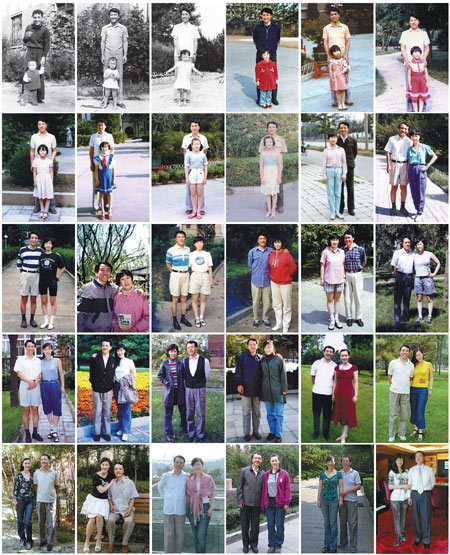I love you, really
Updated: 2013-01-20 07:53
By Tiffany Tan (China Daily)
|
||||||||
Not many Chinese can say the words 'I Love You' easily, and some may even react with fear or suspicion on hearing it - but that's because the culture puts action before words. Tiffany Tan reports.
For Father's Day last year, Zhao Mengmeng made her dad an album of their photos taken at around the same date for 30 straight years. The first in the digital collection is a black-and-white print that shows Zhao at age 1, standing with her dad outside a brick building, her hand engulfed in his. The last shows the pair in full color three decades later, posing against a piano and a chandelier, Zhao's arms linked at the elbow with her 62-year-old father. The album, which Zhao also posted on her micro blog, is seen as a remarkable expression of a child's love for her parents. It has since been viewed hundreds of thousands of times. A video of their story, found online, has been watched at least 2 million times.
 |
|
Zhao Mengmeng makes an album of 30 photographs taken with her dad around the same date for 30 straight years as a remarkable expression of love to her parent. [Photo provided to China Daily] |
"I'm delighted the collection of photos can remind the public that time is fleeting, and so it's important to cherish time with family," Zhao says. "Sometimes people are too busy and take the love and care from their parents for granted."
Besides creating the album and sharing it with the public, how else does Zhao express her love and gratitude to her parents?
By keeping an eye on their health, buying things they need and helping them run errands, says the 31-year-old online media editor.
Has she ever told them "Wo ai ni" - I love you?
"I've never said it face-to-face," she says. "I think saying it is a bit odd."
Even to her own husband, she says, she only utters the words when she's joking around. Using a serious tone, she probably says it "once a year, or twice every three years".
Zhao is typically Chinese. Declarations of love, especially between parents and their children, are highly unusual among the Chinese. It's so unusual that last year, several local TV stations decided to tape the reaction of parents who got a call from their child just to say, "I love you."
"What's going on?" one father said.
"Why is my daughter this happy today? Has she finally found a boyfriend?"
Some pretended not to hear. "Are you coming home for Mid-Autumn Festival?" one mother replied. When her daughter repeated the three words, she said: "I've already sent the money."
Another mother was convinced the line was merely a ploy to get something in return. "OK, what do you want, dear?" she said.
"I don't want anything," her daughter said. "I just really love you."
"Just say it. What do you want?"
Most Chinese believe that when it comes to expressing love, actions are more important than words.
In the Confucian tradition, parents strive to provide their children with a good life, such as quality education and their own home as a wedding gift. In return, children are expected to respect their parents and obey their wishes.
"They tend to express their love through actions and oftentimes leave their good intentions and love unspoken," says Wei-jun Jean Yeung, a professor with the National University of Singapore's department of sociology and Asia Research Institute. "In fact, this is viewed as a virtue in the culture."
Generations of Chinese grew up hearing stories of sacrifice in the name of love, such as those in The 24 Filial Exemplars, published in the Yuan Dynasty (1271-1368).
The classic text on morality includes the heroism of Dong Yong, a figure from the Han Dynasty (206 BC-AD 220), who sold himself into slavery to pay for his father's funeral.
It also talks about 8-year-old Wu Meng, from the Jin Dynasty (1115-1234), whose family was so poor they couldn't afford a mosquito net. On summer nights, he offered his blood to a swarm of mosquitoes so they would not sting his parents.
Last year, the government updated the filial piety standards for the 21st Century. The New 24 Filial Exemplars, released by China National Committee on Ageing, suggests adult children teach their parents to surf the Internet, buy them insurance and help widowed parents get remarried.
Interestingly, item No 11 says: "Tell parents that you love them."

 Li Na on Time cover, makes influential 100 list
Li Na on Time cover, makes influential 100 list
 FBI releases photos of 2 Boston bombings suspects
FBI releases photos of 2 Boston bombings suspects
 World's wackiest hairstyles
World's wackiest hairstyles
 Sandstorms strike Northwest China
Sandstorms strike Northwest China
 Never-seen photos of Madonna on display
Never-seen photos of Madonna on display
 H7N9 outbreak linked to waterfowl migration
H7N9 outbreak linked to waterfowl migration
 Dozens feared dead in Texas plant blast
Dozens feared dead in Texas plant blast
 Venezuelan court rules out manual votes counting
Venezuelan court rules out manual votes counting
Most Viewed
Editor's Picks

|

|

|

|

|

|
Today's Top News
Boston bombing suspect reported cornered on boat
7.0-magnitude quake hits Sichuan
Cross-talk artist helps to spread the word
'Green' awareness levels drop in Beijing
Palace Museum spruces up
First couple on Time's list of most influential
H7N9 flu transmission studied
Trading channels 'need to broaden'
US Weekly

|

|







